



‘Sweet Revolution ', driven by the National Beekeeping & Honey Mission (NBHM), enhances farmer income and pollination. With 1.4 LMT honey production and 1.07 LMT exports (2023–24), India ranks second globally. NBHM boosts quality, traceability, and FPO support through labs and the Madhukranti portal.
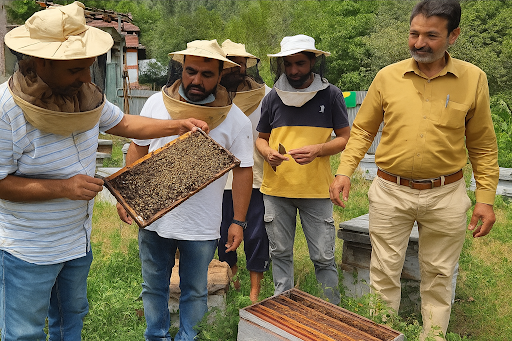
Copyright infringement not intended
Picture Courtesy: PIB
The "Sweet Revolution" supported by the National Beekeeping & Honey Mission, focused on modernizing beekeeping to boost farmers' incomes and contribute to the 'Atmanirbhar Bharat' vision through scientific methods.
It is an initiative to promote apiculture (beekeeping) to accelerate the production of quality honey and other related products.
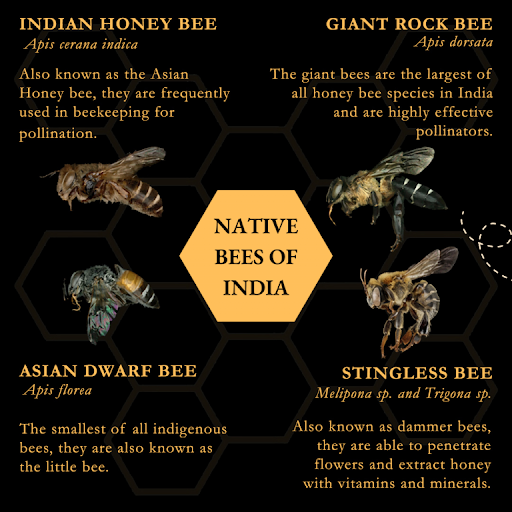
Beekeeping in India, supported by diverse agro-climatic conditions, is a vital component of integrated farming, contributing to rural livelihoods and the national economy.
Economic Empowerment
Beekeeping requires low investment but offers high returns, helping to diversify income for farmers and rural workers.
It supports the government’s goal of doubling farmers’ income while creating opportunities for landless laborers.
Agricultural Productivity
Bees play a vital role as pollinators, enhancing both the yield and quality of crops. For eg; pollination by honeybees can raise radish seed production by 22–100% and increase cabbage and cucumber yields by up to 400%. (Source: ICAR)
Nutritional and Health Benefits
Honey is rich in nutrients and has strong demand in domestic and global markets. Other bee products like wax, royal jelly, propolis, and bee venom have wide applications in the food, pharmaceutical, and cosmetic industries.
Environmental Sustainability
Beekeeping is essential for ecological balance and biodiversity through bee conservation, promoting sustainable farming, and preventing bee colony loss.
|
Integrated farming (or integrated agriculture) is a commonly and broadly used word to refer to agricultural systems that integrate livestock, fisheries, crop production, horticulture, etc. |
It is a Central Sector Scheme, launched in 2020 under the Ministry of Agriculture & Farmers' Welfare, for the overall promotion and development of scientific beekeeping.
Implemented through the National Bee Board (NBB), the scheme was announced under the Atmanirbhar Bharat with a total budget outlay of ₹500 crore for three years (FY 2020–21 to 2022–23), extended to 2025–26)
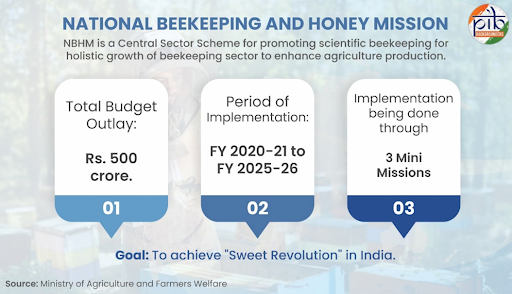
Sub Schemes under NBHM
Boost in Production and Exports
Honey production nearly doubled from 70,000–75,000 MT in 2013–14 to 1.4 lakh MT in 2024.
India became the second-largest honey exporter globally (after China) in 2024, up from ninth in 2020.
In FY 2023–24, India exported natural honey valued $177.52 million. The United States remains the largest importer, accounting for about 78% of Indian exports, followed by the UAE, Saudi Arabia, Libya, Morocco, and Canada.
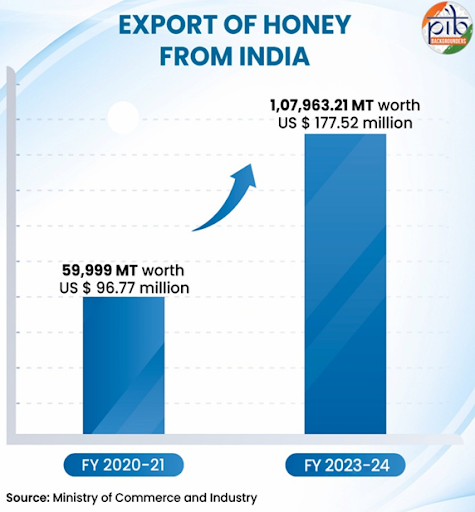
Major states producing honey are: Uttar Pradesh (17%), West Bengal (16%), Punjab (14%), Bihar (12%) and Rajasthan (9%). (Source: PIB)
Infrastructure Development
By March 2025, the government had established or approved 6 world-class Honey Testing Labs, 47 Mini Honey Testing Labs, 6 Disease Diagnostic Labs, and 26 Honey Processing Units.
‘Madhukranti Portal’ improved transparency and accountability by enabling online registration and traceability of honey and other bee products, boosting consumer confidence.
Capacity Building and Empowerment
The Khadi and Village Industries Commission (KVIC), under its ‘Honey Mission’ launched in 2017, has trained over 50,000 beekeepers in modern techniques such as hive management, disease control, and honey extraction.
As of March 2025, 97 Beekeepers’ Farmer Producer Organizations (FPOs) have been formed across India, with special efforts directed toward empowering women. (Source: PIB)
Strengthening Rural Livelihoods
Scientific beekeeping under NBHM has become a dependable livelihood option for small and marginal farmers, tribal communities, and rural youth.
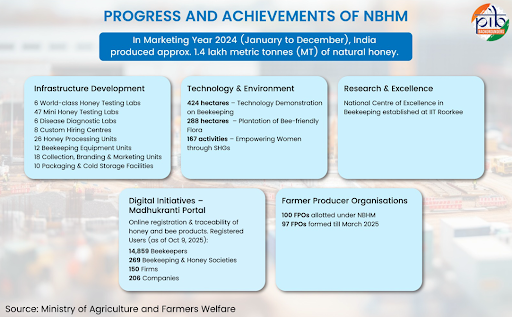
Knowledge and Training Gap
Beekeepers, especially in rural areas, lack access to modern techniques, scientific breeding, and disease management, leading to reliance on traditional, less productive methods.
Pest and Disease Vulnerability
Bee colonies are susceptible to pests like Varroa mites and diseases like Nosema and foulbrood, causing colony collapse and reduced honey production.
Adulteration and Quality Concerns
Widespread honey adulteration with sugar syrup damages the reputation and market competitiveness of Indian honey.
Limited Market Diversification
Over-reliance on the US market for exports makes the sector vulnerable to trade policy changes and demand fluctuations.
Environmental Threats
Unpredictable weather, altered flowering seasons, extreme climate events, and pesticide use disrupt foraging, reduce honey production, and weaken bee immune systems.
Inadequate Infrastructure
Many regions lack sufficient infrastructure for honey processing, quality control, and cold storage, hindering value addition and market integration.
Enhanced Research and Development
Strengthen research on indigenous bee species, promote disease-resistant breeds, and integrate modern technologies like IoT, AI, and mobile sensors for real-time hive monitoring and better management.
Strong Quality Assurance and Certification
Enforce strict action against adulteration and encourage organic certification and Good Beekeeping Practices (GBPs) to enhance product quality and consumer confidence, aligning with global standards.
Market Diversification and Value Addition
Broaden India’s export base by exploring new international markets. Promote the production of high-value hive products like bee pollen, propolis, royal jelly, and bee venom.
Comprehensive Capacity Building and Skill Development
Expand training to remote/tribal areas via master trainers. Promote beekeeping entrepreneurship through workshops, financial aid, and community training.
Integrated Farming Approach
Promote beekeeping as a key part of sustainable agriculture, encouraging farmers to adopt it alongside crop cultivation for improved pollination and productivity.
Stronger Policy Support
Introduce measures like a Minimum Support Price (MSP) for honey, insurance coverage for bee colonies, and simpler export procedures. Recognizing landless beekeepers as farmers would improve access to institutional benefits.
The National Beekeeping & Honey Mission (NBHM) stands as a cornerstone for rural empowerment and agricultural transformation. By advancing scientific beekeeping, India not only enhances farmers’ incomes but also strengthens food security and biodiversity.
Source: PIB
|
PRACTICE QUESTION Q. Examine the potential of the Sweet Revolution to promote inclusive growth in the rural sector. 150 words |
To promote scientific beekeeping and increase the production of high-quality honey and other bee products for income generation.
The Ministry of Agriculture and Farmers Welfare implements the NBHM as a Central Sector Scheme.
CCD is the mass disappearance of worker bees, and it is a major threat to bee colony health and, consequently, honey and pollination services.
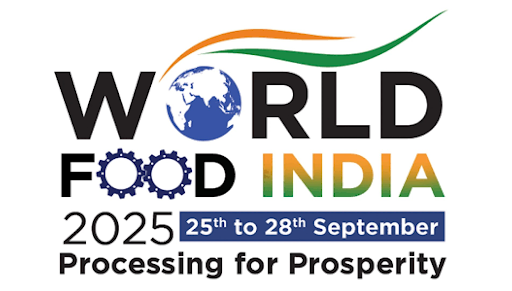
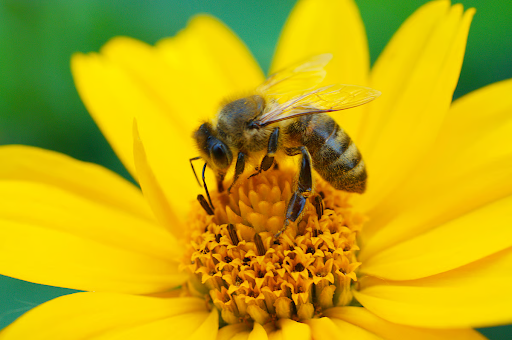


© 2026 iasgyan. All right reserved